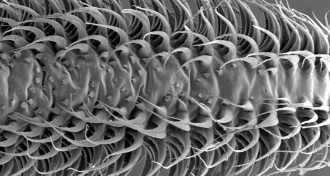Life
Sign up for our newsletter
We summarize the week's scientific breakthroughs every Thursday.
-

-
 Animals
AnimalsTongue bristles help bats lap up nectar
High-speed videos capture stretched-out tongue bumps that stretch out so nectar-feeding bats can slurp up their food.
By Meghan Rosen -
 Neuroscience
NeurosciencePieces of Light
How the New Science of Memory Illuminates the Stories We Tell About Our Pasts by Charles Fernyhough.
By Science News -
 Animals
AnimalsWinged robots may shed light on fly aerobatics
After years of trying, researchers create flapping machines that can hover and perform rudimentary flight maneuvers.
-
 Animals
AnimalsEvolutionary enigmas
Comb jelly genetics suggest a radical redrawing of the tree of life.
By Amy Maxmen -
 Animals
AnimalsDeep-sea worms drop acid to get dinner
Bone-eating worms produce chemicals to dissolve and feed on skeletons.
-
 Animals
AnimalsFossil illuminates ancestry of swifts and hummingbirds
Spectacularly preserved remains suggest that the two avian groups' predecessors got small before splitting and developing their flying chops.
-
 Life
LifeGenetic fossils betray hepatitis B’s ancient roots
Modern bird genomes reveal evidence that virus is at least 82 million years old.
-
 Life
LifeBees need honey’s natural pharmaceuticals
Ingredients trigger insects' genes for detoxification and immune defenses against bacteria.
By Susan Milius -
 Life
LifeSigns of culture in whales and monkeys
Mammals learn feeding behaviors from their friends and family members.
By Meghan Rosen -
 Life
LifeSo far, the great tit has coped with climate change
Earlier arrival of birds’ food due to warming temperatures hasn’t yet reduced bird population.
By Susan Milius -
 Life
LifeBirds may have had to crouch before they could fly
Digital reconstructions of avian ancestors show a progressive redistribution of weight toward the front of the body.